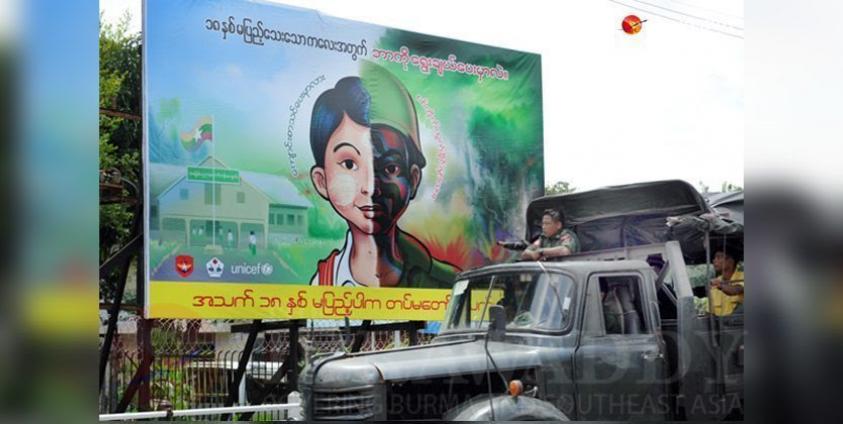As the civil war raged on in northern Shan and Rakhine or Arakan States, with no end in sight and ongoing bilateral ceasefire between the National Alliance – Burma (NA-B) and the Myanmar army or the military far from progressing, the ratification of Myanmar on UN Treaty Banning Use of Child Soldiers is a welcome move for the country.
The Optional Protocol to the Convention on the Rights of the Child on the Involvement of Children in Armed Conflict (CRC-OPAC) aims to protect children from recruitment and use in hostilities was adopted by the General Assembly on 25 May 2000 and entered into force on 12 February 2002.
Myanmar became the 169th state party to the CRC-OPAC in New York on September 27.
Earlier, Myanmar signed the first protocol of the CRC in 1991. Two years later, it enacted the Child Rights Bill. In 2012, Myanmar signed the second optional protocol to prohibit child prostitution, child pornography and child slavery.
According to the Office of the Special Representative of the Secretary-General for Children and Armed Conflict, the Optional protocol is a commitment that:
- States will not recruit children under the age of 18 to send them to the battlefield.
- States will not conscript soldiers below the age of 18.
- States should take all possible measures to prevent such recruitment –including legislation to prohibit and criminalize the recruitment of children under 18 and involve them in hostilities.
- States will demobilize anyone under 18 conscripted or used in hostilities and will provide physical, psychological recovery services and help their social reintegration.
- Armed groups distinct from the armed forces of a country should not, under any circumstances, recruit or use in hostilities anyone under 18.

The Burmese government must prioritize allocation of resources for awareness, age verification and disciplinary action to end the use of child soldiers, advocates say.
As it is, the protocol bars all armed groups, including the non-state armed forces, will have to adhere to the commitment, which is problematic for Myanmar to fulfill it accordingly.
Thus, under the protocol’s Article 3(2) and Article (4), as part of the ratification process, Myanmar filed declarations that will allow it to implement the treaty in accordance with domestic realities, the Foreign Ministry said in a statement.
According to Aung Myo Min, director of Equality Myanmar: “By making the declaration about Article 4, the government means it can’t take responsibility for non-state ethnic armed groups to make sure they don’t recruit or use in hostilities persons under the age of 18 years under any circumstances,” a recent media report wrote.
In this respect, he urged the government to start a dialogue with the Nationwide Ceasefire Agreement (NCA) signatories Ethnic Armed Organizations (EAOs) to facilitate the release of child soldiers.
For the Tatmadaw’s part, between the duration from 2014 to March 2019, the Ministry of Social Welfare, Relief and Resettlement in May released figures that the Tatmadaw allowed 1,579 soldiers under the age of 18 to resign .
“The international engagement taken today by the government of Myanmar to better protect its children is a welcome step,” said Virginia Gamba, UN special representative of the secretary-general for Children and Armed Conflict.
Kyaw Tin, Union minister of International Cooperation, who submitted the Optional Protocol to the Pyidaungsu Hluttaw (Assembly of the Union) on August 30 said: “The objective of the protocol is to protect children from being recruited and used in armed conflicts. It is a very important international protocol in protecting children’s rights.”

A Human Rights Watch report suggests Burma’s military is recruiting children as young as 10, such as these young boys, shown guarding a post in 2004. ((David Longstreath/Associated Press)) | cbc.ca
“By entering into this protocol, we can promote Myanmar’s image in the international community, and it will help us remove our country’s name from the list of those that use child soldiers,” he added.
While this good deed is praiseworthy and should be hailed as an achievement in combating recruitment of child soldiers, which is also being considered by international community as human trafficking, the prospect of ending it will be an uphill battle, as some 80 percent of the 80,000 EAO combatants are non-signatory of the NCA, which the government has no influence.
Besides, the non-signatory EAOs under the pretext of schooling them, teach the children military drill and usage of fire arms. For example, the United Wa State Army has been using such cover up camouflaged recruitment. And as there is a lack of official channel to talk about it in a sensible way, nothing can be done to protect the children.
In sum, the involvement of children in armed conflict will only be workable in a true sense once the civil war ended, peace restored and national reconciliation becomes a goal or “political will” for all stakeholders to pursue earnestly.






